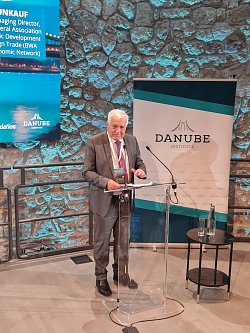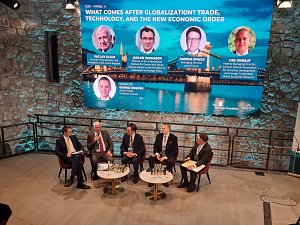Nejnovější
- Václav Klaus pro iDNES: SMS považuji za nešťastné, ale žádné vydírání to není
- Ivo Strejček: Pražský hrad jako centrum opoziční politické moci
- Ladislav Jakl: Kapitalismu je 35. Všechno nejlepší a dlouhá léta
- Václav Klaus pro Protiproud: O střetu Hradu s vládou 35 let po spuštění kapitalismu
- Budoucnost Evropy v éře dnes probíhajících geopolitických posunů
Nejčtenější
- Ivo Strejček: Domýšlí Petr Pithart svá slova?
- Václav Klaus pro iDNES: SMS považuji za nešťastné, ale žádné vydírání to není
- Václav Klaus pro Protiproud: O střetu Hradu s vládou 35 let po spuštění kapitalismu
- Ivo Strejček: Kvadratura grónského kruhu a český zájem
- Jiří Weigl: Německé výročí v závoji nejistot
Hlavní strana » English Pages » What Comes After…
What Comes After Globalization?
English Pages, 16. 9. 2025
 Many thanks for the invitation to another Danube Institute and Heritage Foundation conference here in Budapest. It is always refreshing to be here. Many thanks for inviting me to speak on this panel. We are now on the second day of the conference, much has already been said. It is therefore difficult to specifically address the topic of this panel, because similar ideas have been discussed here the whole day.
Many thanks for the invitation to another Danube Institute and Heritage Foundation conference here in Budapest. It is always refreshing to be here. Many thanks for inviting me to speak on this panel. We are now on the second day of the conference, much has already been said. It is therefore difficult to specifically address the topic of this panel, because similar ideas have been discussed here the whole day.
Nevertheless, I have accepted the task to give the introductory comments for this panel. I did it, even though I disagree with the basic idea of its title: “What Comes After Globalization?” I have doubts about the term globalization itself. I don’t want to disrupt the pleasant and friendly atmosphere of the conference, but I have to present and defend a different view, a view I have held for many years. I am afraid the title of this session is misleading and leads us astray.
It is not possible to deny that we have moved to a new phase of the world economy which is characterized by a lower level of openness than it was the case in the last decades. But is it appropriate to label the current era as an era after globalization? I don’t think so. Let me look at it from a different angle.
The question in the title of this panel is based on the very dubious assumption that – until now – we have been living in an era of globalization and that this era is now coming to an end. I consider this a wrong way of thinking, a wrong reasoning, a wrong reading of history. To my great regret, this argumentation is more or less accepted and taken for granted in intellectual circles all over the Western world. It is accepted even by serious and thoughtful people. This is a puzzle for me.
I suspect this way of thinking comes mainly from the US, from a country which has been continually losing its hegemonial position and which doesn’t want to accept the new world arrangements. This change is part of the ongoing shift from a unipolar to a multipolar world. We are not yet there, of course.
I have, if I am not wrong, never used the term globalization in my writings or speeches. It was because I didn’t need it. If I have used it, then only by mistake, or unintentionally due to a lack of attention. For me, globalization is not a well-defined concept. It is a journalistic term – very fuzzy, very superficial and unhelpful as a basis for a serious debate.
As I said, there is no doubt that something has happened in the last decades, but I think it would be appropriate to call it more neutrally internationalization of human activities. It would be more helpful and more productive to discuss it in terms of degrees of closeness and/or openness. The world’s history is a process characterized by varying degrees of openness and closeness, depending on political, economic and social arrangements. These arrangements are the consequence of varying degrees of freedom as well as of the nature of the political system. The freer a society (and economy), the more open it is. And vice versa. I would, therefore, recommend to return to the old terminology.
Instead of being lost in ancient history, let’s stay in the era of our own lives, let’s stay in the history sort of “experienced” by us, by our generations, and in the – by us foreseeable – future.
 I myself spent more than half of my life in a semi-closed communist society and economy (leaving aside that I was born and spent six years in the Nazi Protectorate of Bohemia and Moravia). During the Cold War, we looked with envy across the Iron Curtain at the open society flourishing in the free West. After this – four decades lasting – communist “experience”, I enjoyed a revolutionary opening up and a relatively short time of life in an authentically free society.
I myself spent more than half of my life in a semi-closed communist society and economy (leaving aside that I was born and spent six years in the Nazi Protectorate of Bohemia and Moravia). During the Cold War, we looked with envy across the Iron Curtain at the open society flourishing in the free West. After this – four decades lasting – communist “experience”, I enjoyed a revolutionary opening up and a relatively short time of life in an authentically free society.
This is over now. This era came for me to an end with our entry into the EU and with the transformation of this institution from an economic integration into a political union. This era also came to an end because of the victory of ideological opponents of free markets and free trade, because of the victory of progressivism, wokeism, environmentalism, multiculturalism, human-rightism, genderism, etc. This is, more or less, the frame of reference from which I look at the world around me.
After World War II, the world experienced a radical opening up, which led to increasing internationalization of human activities, not just economic ones. The ongoing growth in international travel of hundreds of millions of people reflected not just falling travel costs, but – more importantly – growing wealth of society, not only in the already developed countries. In economic terminology, it was a classic wealth effect.
This era was accompanied by a huge increase in international trade, which led to the temporary dominance of the ideology of free trade and free markets. The struggle for or against free trade was the main characteristic of the last 80 years. We could repeat all the well-known arguments about free versus fair trade (which means protectionism), but that’s quite different from talking about globalization. Why and when did someone, instead of continuing the debate about free trade and free markets, shift the debate to globalization?
My tentative answer is that it happened in the moment when the discussion moved from the hands of old-school ideologues and philosophers (like Mises, Hayek, Friedman and their supporters in politics) to those who wanted to rule (or govern) the world and who have in mind more the global governance than freedom and free markets. That led to the emergence of the term globalization even though there was something else behind it. It was globalism, an ideology, which is in favor of global governance, and which is promoted by those who want to govern the world and are engaged in global institutions, global banks or firms. This is, of course, the exact opposite to free markets and free trade.
We should resist this way of thinking. It accepts the premises of our eternal opponents. It weakens us. You raised the question what will come next? That depends entirely on our ability to win or lose the contemporary intellectual debate. If we accept the term globalization, we are already halfway to losing it. That’s why my controversial remarks here this morning.
Václav Klaus, Geopolitical Summit, Budapest, September 16, 2025
- hlavní stránka
- životopis
- tisková sdělení
- fotogalerie
- Články a eseje
- Ekonomické texty
- Projevy a vystoupení
- Rozhovory
- Dokumenty
- Co Klaus neřekl
- Excerpta z četby
- Jinýma očima
- Komentáře IVK
- zajímavé odkazy
- English Pages
- Deutsche Seiten
- Pagine Italiane
- Pages Françaises
- Русский Сайт
- Polskie Strony
- kalendář
- knihy
- RSS
Copyright © 2010, Václav Klaus. Všechna práva vyhrazena. Bez předchozího písemného souhlasu není dovoleno další publikování, distribuce nebo tisk materiálů zveřejněných na tomto serveru.
















